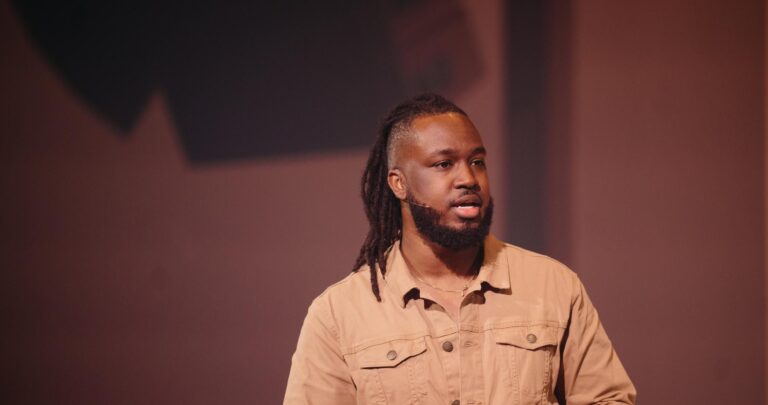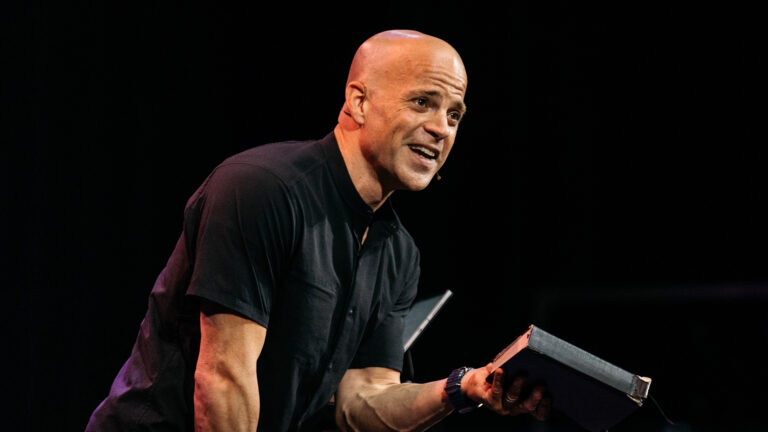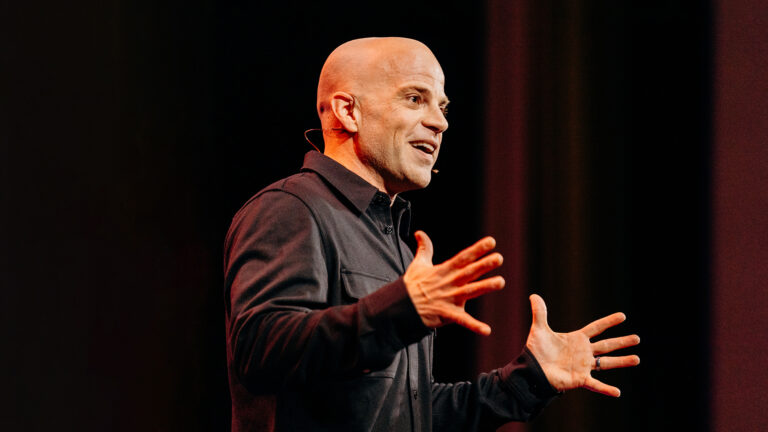What do we do when our allegiance to Jesus puts us at odds with the dominant culture?
This week, Ben Stuart is back at it in our Take Heart series through 1 Peter. As Peter’s letter shifts from our identity in Jesus to our actions as His followers, Pastor Ben shows us that we are not meant to fight AGAINST people with different worldviews and lifestyles; we fight FOR them.
Key Takeaway
There's always been friction between religion and politics. Jesus shows us a better way than completely upending an adversary or becoming a doormat and allowing everything to just happen. He shows us how to live in a culture that is completely against everything we believe and value. We are called to live by conviction and compassion: it's the only way to change the world.
We need a little history lesson to understand the world in which Peter was writing. It will help you grasp why Jesus being born was such a threat to Herod and why His resurrection posed an even bigger threat to Rome at large. His people were remaining faithful and standing firm in the face of the following:
Rome had done a lot of good for the world; a path to success, safety, and stability. Yet Rome was also BRUTAL. It constantly killed dissidents and practiced genocides. Suetonius, a Roman historian lets us in on the life of the Caesars. Augustus reigned for 40 years and handed the empire over to Tiberius. He kills off all his rivals and then goes to the island of Capri where he would throw children off of cliffs after he abused them. He was a monster. Tiberius adopted Caligula but would make fun of the little boy all the time because he killed off his family. Interestingly, Tiberius was suffocated one night...maybe Caligula had had enough. So, Caligula takes over and somehow becomes even worse. He also killed off all of his enemies and did unspeakable things. His guards finally got fed up and killed him in the streets. His uncle, Claudius is now put in charge, but he's an absolute imbecile. He marries his niece and tries to act like it's normal. It's not. She poisons him to death so that her son, Nero, could be in power. As soon as he ascends, he kills his mother and his wife. He marries a second wife but kills her by kicking her to death while she is pregnant. He felt bad about it, so he married a 13-year-old boy who looked like her and made him wear her clothes while he paraded him around. He was a terrifying monster. Nero ended up killing himself as others were coming to murder him. Peter would end up being martyred under Nero. This is the culture that Peter is writing to believers in.
What do you do when you have sworn your allegiance to a society and community whose vision and values are at odds with the dominant culture? We face this currently. Even today Christianity is viewed as odd, strange, even bad or immoral.
When Peter was writing it wasn't yet widespread policy to persecute Christians, but there was increasing pressure to shame. Shame is a powerful weapon, it forces someone to self-censor.
What do you do?
1) You can choose to attack. You rise up, you take control, so you have power.
2) Assimilate and just go along with the current culture.
3) You don't attack or assimilate. You transform culture through a transformed life. You hold your convictions, but you hold them with gentleness and respect. You don't attempt a coup against your opponent, but you don't conform either. You hold your convictions with grace and if misunderstood, you suffer, and if need be: you die well.
Peter advocates the 3rd option. Is it effective though?
Jesus never left a certain region, Judea, Samaria, Galilee. His entire life was in a small part of the world. But in 110 AD, the gospel had spread all over the world. But in 300 AD, the Roman Emperor himself, Constantine, had allegedly become a Christian. Some say he truly did convert, others say it was a "can't beat them, join them" situation. Don't be quick to dismiss the 3rd option- it's still happening today. Christianity had better ideas and the people embodied them, they didn't just profess them.
Peter reminds them that their identity matters. 1 Peter 2:11.
Sojourners and exiles, not usurpers and victims. They, just like us, are near a community, but not one of them. We are an emissary of a different King, so we reflect a different culture. We are beloved and strange to the world around us. So if we don't look different than our non-believing coworkers...THAT'S strange.
We are dearly loved and should look different. As people have intimacy with the Almighty, it impacts their activity.
1) Abstain - we don't indulge the passions and desires of our flesh. We don't do them because we are trying to be special, we don't participate because they waged war on our soul. Our desires lead us astray and are destructive to us. There is a crazy part of all of us that we have to talk back to; it takes more than it gives. This is where "you be you" and "follow your heart" will wage war on your soul. For example, the Christian sexual ethic is much more restrictive than the world's, but it's not to rob you, it's to save you. As time has gone on and more and more is permitted and people allow themselves to indulge in whatever they please, people have become more lonely, lost, and disconnected than ever before. It's waged war and there are casualties.
2) Keep your conduct honorable. Do good so they see your good deeds. There's an overlap between the cultures of doing good. Find the common ground. Be a redemptive force in the culture. We do it for them so they'll see God glorified in us by the way we treat them.
This abstention and activity will confuse a non-believing culture because your moral purity will often be read as arrogant. They will slander you, yet it's your affection for them that will cause them to be drawn to you. Christians weren't killed for believing in Christ. They were killed for believing ONLY in Christ. Yet, Christianity kept growing because they were so devoted to Christ, their conviction, and one another.
Jesus called out the religious leaders when they put Him on trial and said they had the authority to judge Him. He calmly replied that they were looking at the Ancient of Days, the Messiah, the Promised One. He was always in control and even to His last, he was laying out salvation to them. Paul did the same thing when he was brought before King Agrippa; he witnessed him. Polycarp asked for one more day to live and used it to share the Gospel. Their conviction and compassion were irresistible to those around them. They still ended up dying, but they died well.
This doesn't mean we don't get to speak our opinion or question ideas. John the Baptist showed that you are allowed to disagree with ideas, say it's wrong, and then embody a different set of ideas. We're meant to do that, but remember, your political adversary has an eternal soul. You don't have to attack. You're not fighting against them, you're fighting for them. You embody a different set of values and ideas for their sake because you want them to know Him.
Peter charged a guy in the Garden of Gethsemane and Jesus stopped him. He reminded him that they were not a political coup, not here to burn it all down. Peter never forgot that. Two years after this letter was written he died under Nero's rule, but the Church spread.
Conviction and compassion change a culture. That is what we are meant to do. That's who we are meant to be.
1 Peter 2:13. God has instituted government because we need human structures to punish evil and praise those who do good. Believers see the cracks in society and lean in to repair them. If you're governing, you're trying to get people to stop doing what is evil and start doing good. So many believers were called to work in government. They resist where they have to and always show grace and respect. (Joseph, Daniel, Nehemiah, Shadrach, Meshach, and Abednego)
We are free, we belong to God alone. Don't abuse that freedom, instead, honor everyone even if they disagree with you. You start by fearing God. Then you love the brotherhood of believers. You need a strong inner ring to change the outer ring. And how do you honor your greatest opponent? Pray for those who persecute you.
Quote
"Conviction and compassion changes a culture. That what we are meant to do. That's who we are meant to be."
Ben Stuart
Discussion Questions
Message Topics
Scripture References
- 1 Peter 2:11-17
- Luke 22:67-69
- Acts 26
- Matthew 14:3-5
- Mark 18:10
Keep Browsing







